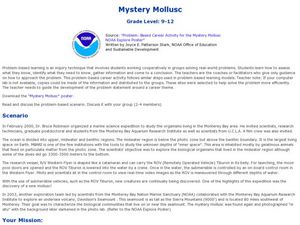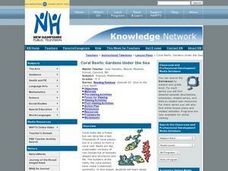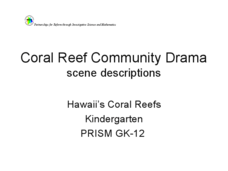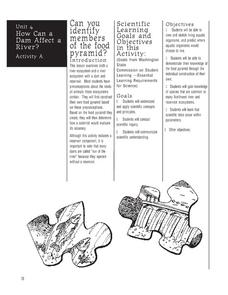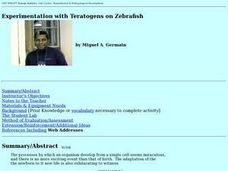Curated OER
Matching Pairs
In this matching worksheet, students study sea creatures. Students study 4 animals in each box circling the two sea creatures that match.
Curated OER
Mystery Mollusc
Students investigate the different regions of our oceans by researching the Internet. In this oceanography lesson, students discover the different jobs related to ocean research and examine their roles by reading related websites. ...
Curated OER
At the Beach
Students answer a variety of question about going to the beach. They discuss vocabulary words associated with the beach. They listen to some music of waves and seagulls while the teacher reads a short story. They pretend to pack a...
Curated OER
Coral Reefs: Gardens Under the Sea
Students discover the wonders of coral reefs while listening to a book about them. In a Reading Rainbow video activity, they simulate a dive, check equipment and explore a reef. Role-playing as marine biologists, students uncover...
Curated OER
Under the Sea
In this writing template, students are provided with a lined sheet for an essay on the ocean and/or ocean animals. Students can conduct research on their topic and write a short essay on the lines provided.
Curated OER
Find the Ocean Animal Words
In this ocean animal words worksheet, students define, discuss, locate and circle six key words associated with ocean animals: fish, whale, dolphin, crab, shrimp and shark,
Curated OER
Number 3
In this counting to 3 worksheet, students count and color the sea creatures in each of 6 sets. Students circle the one set that has 3 objects.
Curated OER
Ocean Fractions - Parts of a Set
In this fraction worksheet, students circle the fraction that shows which part of each part of 4 items is shaded. They examine the sets which are made up of clip art pictures of sea creatures. They write the fraction that shows the part...
Curated OER
Funny Fish Fractions
In this fraction worksheet, students circle the fraction that shows what part of each of 4 sets of sea creatures is shaded. They fill in the fraction that names the portion of the set that is shaded in the last 4 sets.
Curated OER
Do Fish Clean the Ocean?
Pupils analyze a reading selection. In this ocean lesson, students read a story about the ocean, ocean animals and coral reefs. Pupils have the option to complete internet research on coral reefs. Students write in their journals...
Curated OER
Blowing Bubbles, Blowing Colors
Students examine the properties of bubbles by testing different bubble making materials. In this scientific experiment lesson, students create a bubble brew with different soaps while observing the different strengths and sizes of the...
Curated OER
Dive In
Students study how buoyancy, pressure, and light can effect the work of underwater scientists. In this marine science lesson students complete a lab that allows them to better understand how pressure varies with altitude and depth.
Curated OER
Coral Reef Community Drama: Scene Description
Students are organized into groups and are assigned puppets according to what sea creature their group represents. In this reef lesson, students identify sea creatures according to their place in the food chain then discuss how these...
Curated OER
Wildlife
The centerpiece of this lesson plan is a predator-prey simulation in which colored paperclips represent different species of animals camouflaged against a colored background. Relevant follow-up questions are provided. The activity is...
Foundation for Water & Energy Education
How Can a Dam Affect a River? Activity A
Written for Washington state students in life science, this lesson provides an opportunity to examine the residents of local freshwater habitats. You or the class collects a water sample, and learners try to examine what organisms live...
Curated OER
Experimentation with Teratogens on Zebrafish
Students compare mitosis and meiosis with regard to chromosome number in parent cells versus daughter cells, types of cells produced, total number of cells produced, and the number of divisions. In groups, identify and differentiate the...
Curated OER
Ecosystems
In this ecosystems worksheet, students complete a crossword puzzle with 35 questions about the different types of ecosystems and organisms in them.
Curated OER
Lesson 2: Maine's Merchant Marines
Students simulate the quarters aboard a ship. They write a letter to Joanna Colcord or Alice Drinkwater that shows an understanding of the experience of being aboard ship, and asks further historical questions about the experience.
Curated OER
Homes for Hermit Crabs
Students discover the differences between hermit crabs and mollusks and identify their parts. After reading a story about hermit crabs, they complete an anatomy worksheet. For another activity, students fold and cut a diagram of a hermit...
Curated OER
Love A Lobster
Learners discuss the appearance of a lobster. Using pre-cut parts, they create their own lobster and name each part of its anatomy. As a class, they listen and participate in exploring background information on the lobster and its...
Aquarium of the Pacific
Turn a Cow into a Whale
Third graders explore animals that might have a common ancestor and resemble one another. For this cow and whale lesson, 3rd graders recognize the similarities between the whale and the cow. Students complete worksheets based on the...
Discovery Education
Sonar & Echolocation
A well-designed, comprehensive, and attractive slide show supports direct instruction on how sonar and echolocation work. Contained within the slides are links to interactive websites and instructions for using apps on a mobile device to...
Curated OER
The Wonderful World of Slugs
Examine a slug? Of course, what else would a 2nd grader do with it? Pupils use clues and go on a slug hunt, read a slug story, or make a cooperative group mural of a slug's habitat. While older learners catalog slugs, go on a slug hunt,...
Curated OER
CSI Clamshell Investigation
Pupils explore and explain how moon snails eat and where the holes in clamshells come from and then draw conclusion from the data collected. They incorporate math and graphing skills to determine if there is a relationship to a clam's...



